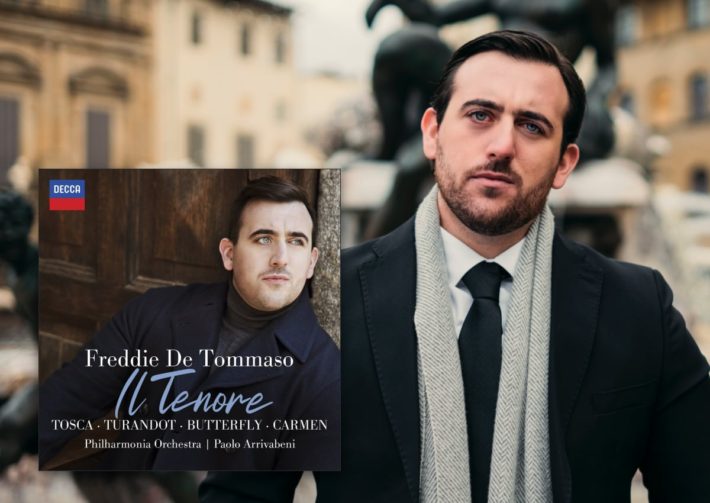Image: Craig Gibson
Freddie De Tommaso follows up his debut album, “Passione,” with this new release, featuring several guest singers, in music by Puccini and Bizet. The first album, a collection of Neapolitan and Italian songs, met with considerable acclaim, and this survey of operatic arias is sure to receive similar accolades.
In “Recondita armonia” (Track 1) the velvety richness of the voice, as well as its tonal consistency over a wide range, is deeply impressive. Yet in following series of excerpts from Tosca (Tracks 2-5), he and guest soprano Lise Davidsen focus more on beauty of tone at the expense of real characterization. Perhaps it is unfair to look for this in such a brief excerpt but turn to the performances by Domingo/Scotto/Levine or Corelli/Price/Adler (both admittedly taken from complete recordings), and you hear what is missing in these interpretations. Yet when Tommaso sings “E lucevan le stelle” (Track 6) alone there is greater personality, desperation and sadness more evident.
The two selections from Turnadot (tracks 7 and 8) again reveal lustrous tone and a thoughtful demeanor. Tommaso brings an introverted quality to both arias (“Non piangere, Liù” and “Nessun Dorma” respectively) that very much avoids the histrionics of other performance. Yet the climax of “Nessun Dorma” (beginning at 2’35”) has marvelous power and plenty of passion, and it is an unexpected bonus to have Apollo Voices singing the chorus part.
Related Posts
- Review: Grieg – Songs – Lise Davidsen, Leif Ove Andsnes
- Review: Made for Opera – Nadine Sierra, Soprano
- Review: EDEN – Joyce DiDonato, Mezzo-Soprano
The two selections from Madame Butterfly, featuring soprano Natalya Romaniw, are more successful because both singers are more engaged in telling the story. Theirs is an ardent, deeply felt desire, and their final high C (track 10, 3’21”) is absolutely enthralling
In “La fleur que tu m’avais jetée” Tommaso again chooses a more introverted characterization, but here it seems misplaced. Don José is wrestling with his obsession for Carmen, and greater loss of control would not go amiss. Similarly, in his duet with Carmen (C’est toi, c’est-moi!), Tommaso lacks menace and suppressed rage, while Carmen should perhaps be more fearful for her life. Nevertheless, with the entrance of the chorus (track 14) the emotional temperature is raised (Tommaso’s high notes thrillingly caught), without ever challenging the classic accounts by Angeles/Gedda/Beecham (Warner Classics) or Berganza/Domingo/Abbado (DG).
The liner notes, along with several photos, focus exclusively on Tommaso. While this album is surely intended for his fans, perhaps first-time listeners might want to learn something about the music as well? Thankfully full texts and translations are provided. The playing of the Philharmonia Orchestra under Paolo Arrivabeni is exemplary, amble freedom provided to the singers to individually shape each phrase. The orchestra performs with tremendous finesse, establishing the right atmosphere, making every climax more lustrous with tonal splendor.
For purchasers of the physical CD, 49 minutes is entirely too short – no label should issue a new recording lasting less than an hour. Especially in this case, where so many of the tracks are duets, surely there could be more solo material? Nevertheless, the music making is, for the most part, first-rate, and hopefully we can look forward to a series of distinguished recordings from this singer in the coming years.

Il Tenore
Freddie De Tommaso – Tenor
Lise Davidsen – Soprano
Natalya Romaniw – Soprano
Aigul Akhmetshina – Mezzo-Soprano
Philharmonia Orchestra
Paolo Arrivabeni – Conductor
Decca, CD 4852945
Recommended Comparisons
Read more classical music reviews or visit The Classic Review Amazon store
Follow Us and Comment:
[social_icons_group id=”964″]
[wd_hustle id=”HustlePostEmbed” type=”embedded”]











